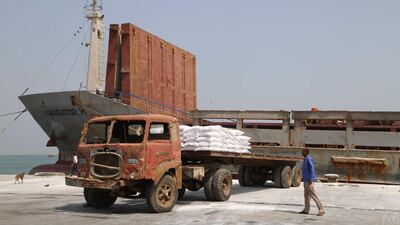The UN special envoy to Yemen met Yemen’s vice president on Wednesday to try to regain the government’s trust after accusations that he was biased towards the Houthi rebels.
Martin Griffiths brokered a ceasefire agreement between Yemen's government and the Houthis during peace talks in Sweden in December.
But the government has accused the envoy of siding with the rebels, claiming he had “lost his ability to be a neutral arbitrator”.
Its criticism of Mr Griffiths centres on the rebel handover of Hodeidah’s ports to the coastguard, who the government says are rebel fighters disguised in different uniforms.
Mr Griffiths met Vice President Ali Al Ahmar in Riyadh to salvage the country’s fragile peace deal.
“The meeting discussed steps needed to move forward with the peace process in Yemen, and reiterated the importance of achieving substantial and speedy progress in implementing the Stockholm agreement," the envoy’s office said.
Mr Griffiths reaffirmed the UN's commitment to working with the parties for a comprehensive, Yemeni-led peace agreement, and urged all parties to create an environment conducive to making this a reality.
“I was encouraged by the openness and flexibility of the government of Yemen and its continued commitment towards achieving peace,” he said.
“We are determined to advance the peace process based on the national dialogue outcome, the GCC initiative and related security council resolutions, and restart soonest possible consultations with the parties,” he said.
The government has also complained that Mr Griffiths has treated the Houthis as if they were a de facto government.
It accuses him of accepting the Houthi's statements on their withdrawal from Hodeidah without the presence of government observers, as was previously agreed to.
Wednesday's meeting followed reports that the government was withdrawing from the peace deal.
Reports suggested that breaches of the agreement by the Houthis had pushed the government to re-examine its position, a claim an official denied.
"No such move is in consideration," the official told The National.
The government reaffirmed the "UN adherence to the three references of the Yemen peace process and to the actual Stockholm deal", he said.
The war in Yemen broke out after the rebels seized Sanaa in 2014, driving the internationally recognised government from the capital.


